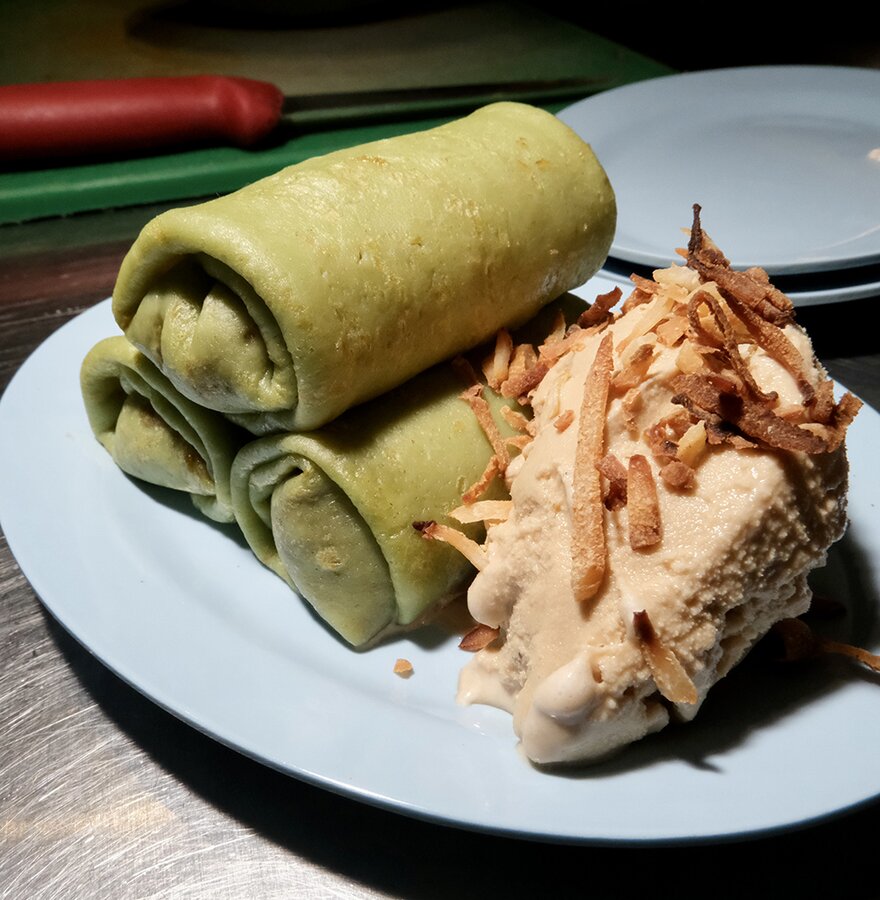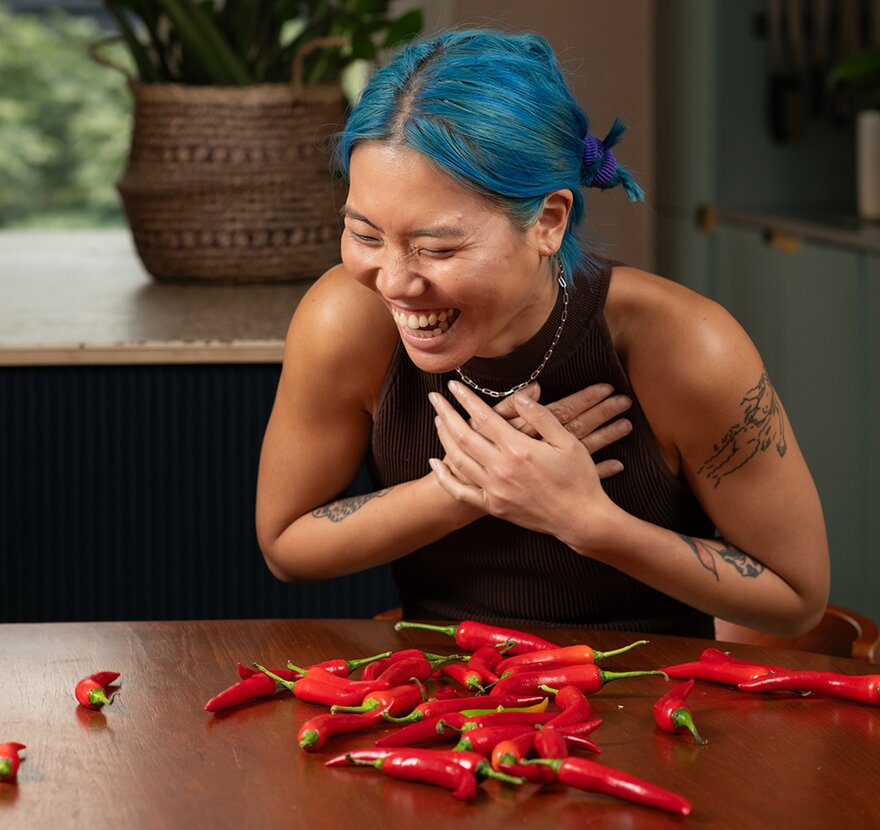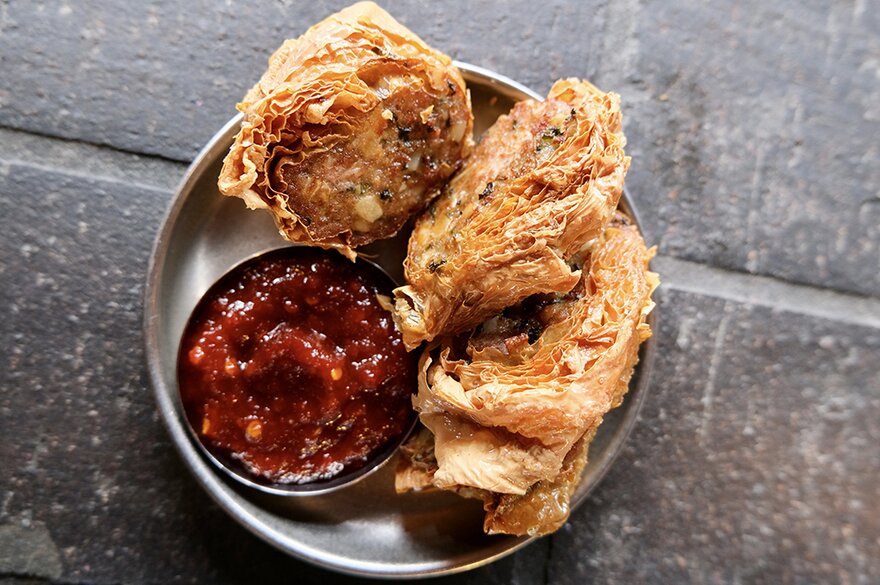Abby Lee took several evolutions to find the style of cooking that would both bring in crowds and showcase her culinary roots. Emma Lake hears how a journey home to Singapore revealed her culinary destiny
Abby Lee found her calling in a bowl of perut ikan, a Malaysian sour curry of preserved fish stomach containing an abundance of fragrant herbs.
The chef had travelled from her home in London to stay with her family in Singapore in 2020. Somewhat bruised by the pandemic, which had seen her first solo pop-up cut short, she was left contemplating her next move with a deep-rooted feeling that she hadn't yet found her culinary voice.
But sitting with her family to eat the Nyonya dishes of northern Malaysia, passed down from her grandmother, she found herself rejuvenated and with a mission to learn how to cook her ancestral cuisine and bring its punchy flavours to London. "I was back home, eating the food I'd grown up with, but which I'd never really paid attention to," she explains. "It really nourished me, and I realised I didn't know how to cook any of it. I had never thought about how it was made – I'd just taken it for granted. After finding that comfort I went to my aunt and said, ‘can you teach me?'."
Two years on, she is relocating from a successful residency at Market Peckham to open her first solo bricks and mortar site in Clapton, east London, serving the regional dishes that have been passed down through her family.
When Lee asked her aunt to teach her to cook Nyonya cuisine, she already had cheffing credentials. At the age of 23 she left Bristol University, where she had been studying economics, to enrol in Le Cordon Bleu London. On graduation, with the terms of her visa preventing her from taking a job in the UK, she returned to Singapore and began working in a Sicilian restaurant. The "romantic allure" of Italian cuisine saw her travel to Puglia, where she spent two years staging.
She says: "The south of Italy resonated for me. It was the seafood and those very simple vegetable and chickpea-based dishes. It felt very romantic to have all this beautiful produce coming in every morning. I'd look around and the trees were brimming with the fruits and vegetables that we'd cook with each day. Everything was so simple, using olives from trees outside – it all made sense."
While embracing the ethos of those rural Italian restaurants, Lee had a dawning realisation that there was only so much she could learn in kitchens that felt "about 10 years behind Copenhagen or London" and so she began planning her return to the UK.
Back to Brit
To gain a visa she needed to start her own business, so she secured a pop-up space and the first iteration of Mambow was born as a daytime café in east London serving the fresh salads and dishes she had learned to cook in Italy, with a south-east Asian twist.
Two months later the pandemic hit and Lee was forced to shut up shop, with a feeling that she hadn't yet honed a style that was truly hers. She pivoted to meal kits, teaching recipients to prepare Malaysian dishes through online tutorials, before deciding to return to Singapore and take stock.
While the kits had received rave reviews, Lee describes a "low period", cooking out of basement kitchens, interacting only with delivery drivers, unsure of where her career should go next. She explains: "I hadn't really gone through any period of self-reflection, I was just jumping through different things to get to a goal which I wasn't really sure of. I think I had hit a roadblock and I had to let go of what I thought my ambitions were."
At the family table in Singapore, she found herself reassessing the food she had eaten as a child, excited by the complex, punchy flavours of regional dishes, that she hadn't been able to find in London. All of a sudden she had a new sense of purpose and a new teacher, in the form of her aunt.
"It was igniting all my senses", she says. "After not being around this sort of food for so many years and being so completely disconnected [from it], it was so interesting to work with her and with these ingredients. I knew that's what I wanted to bring back to London, as I knew there would be people who wanted to taste and experience this food too."
She and her aunt began cooking together daily. "She's a really inspiring woman," Lee says. "She ran a bakery business and it was so amazing to see a woman in power, running it and developing all the recipes. The way she spoke about the dishes we were cooking, how my grandmother had made them and all the stories attached to them, she was so passionate about the food she grew up with and it was really inspiring.
"I was trained with recipes and strict measurements, but for her it was just instinct. She can put ingredients together for a curry paste by eye and then taste it raw and know it needs more shallot. I think that only comes with cooking dishes thousands of times."
Fishy flavour
Lee's education began in the markets of Singapore, where she began familiarising herself with ingredients. She describes "eye-opening" moments as she immersed herself in the flavours and fragrances of produce and learned the intricacies of techniques honed over generations. The pair spent six months going through her grandmother's recipes, with Lee carefully measuring ingredients while making notes and videos to help her recreate them back in London. Perut ikan was a dish that particularly inspired her, its preparation beginning with a collection of herbs including wild betel leaf, bunga kantan (torch ginger flower), kaffir lime leaf and Vietnamese mint from her aunt's garden and ending with a complex dish layered with flavour.
She says: "The flavours are so fishy and deep with so much tamarind, coconut milk and pineapple, it's really moreish – you want to drink a whole bowl of it. I was immediately like ‘someone at home in London has to taste this'. But I wasn't sure how I would present it – half of it is herbs – and I was thinking ‘who would chew through all of these?'. Also, it's fish stomach, which is a hard sell, and I probably would have had to start preserving fish stomach from my fishmonger – was that possible?"
So began the challenge of modifying recipes while retaining their flavour profiles. In the case of perut ikan this saw Lee add dried salted fish to oil, melting it down, before adding a curry paste boosted with shrimp paste and cooking it for around 45 minutes to release the flavour. She then layered ingredients such as pineapple and freshly squeezed tamarind, with the addition of fish sauce at the end.
When it came to herbs, she turned to what was readily available in London – kaffir lime leaves, laksa leaf, mint and lemon verbena – building up a profile that could replicate the taste that had proved so alluring.
"That all came together and, drinking that soup, I thought we could make it work," she says. "To make it more visually appealing I added more seafood elements – some clams and really beautiful grilled fish – so by the end it was almost like a platter. From that experiment I realised what Mambow really could be. Taking those traditional recipes and core flavours I could create something that may not look exactly like the original, but that people would love. I realised that could be my voice."
Mambow has since championed the Nyonya dishes Lee's aunt taught her to prepare and which she has since researched extensively. Nyonya is a fusion cuisine that emerged following intermarriages between Malays and early Chinese settlers. This hybrid of Chinese and Malay cuisines differs vastly across the regions of Malaysia with Nyonya cuisine in Penang also combining influences of neighbouring Thailand leading to dishes that are tangier, spicier and more savoury than those found in Melaka to the south, where flavours are sweeter and creamier, with more coconut milk, Malay spices and Indonesian influences.
Finding her flow
Lee returned to London, her suitcase bulging with recipe books, bottles of soy sauce and dried chilies and began cooking her dishes for the capital's diners, starting with supper clubs held at Mortimer House in Fitzrovia.
She says: "It was quite nerve-wracking as I was so used to cooking European food for others, and it was a whole other experience to the first pop-up in Spitalfields. You can feel it in you when you're doing something you're passionate about. I was working with these ingredients that were a daily reminder of home, those smells and the memories of my aunt teaching me. I carried that with me when I was cooking and it gave me a huge sense of purpose."
Lee's next step was to Market Peckham, a new food hall with a communal dining space. Despite the surroundings Lee did not set out her offering as street food, feeling it would not acknowledge the labour and intricacies going into the dishes. As such she was the only operator to launch serving food on plates, although others would follow her lead.
She says: "We were cooking things London hadn't seen before because they've only been familiar with dishes like roti and laksa, but those dishes hadn't showcased just how punchy these flavours can be.
"With the open kitchen I had to gain experience explaining dishes. It was good for me to have that chance to learn how to explain it in the right language. Even when I wrote it on the menu at first, it was all in Malay or Chinese words, and then I realised we just weren't there yet and I needed to explain.
"It started flowing out much more easily around six months in and it was such a great way to connect with people. We were changing the menu every two months and it was really fun discovering the unknown dishes we could put out. Malaysian people were coming and saying they couldn't believe this was here."
Success in Peckham saw Lee approached with offers of sites and, when she visited Clapton, it seemed the perfect next step, with 20 seats inside, a further 15 to 20 covers outside and a pre-existing kitchen. The décor will combine Lee's European upbringing with Malaysian nostalgia, including lots of primary colours as well as heritage Malaysian tiles from which she's creating an installation artwork.
Many favourites from Peckham will remain on the menu, including a sour pineapple curry, to which Lee has added Chinese-style chive dumplings in a move she describes as "untraditional" but "a match made in heaven".
Lor bak (pork and prawn laced with five spice, wrapped in bean curd skin and deep fried) could not be left off, having gained something of a cult following, including being described by then food critic of The Sunday Times Marina O'Louglin as like "a greedy and mildly debauched deity decided to reinvent the sausage roll".
But, moving to a larger kitchen will allow the chef to expand what she can offer with the addition of grilled items. She is working on pork and prawn laced with five spice, wrapped in bean curd skin and deep fried and a grilled squid stuffed with flavoured rice, which will be served alongside a squid ink curry, with a base of lemongrass and dried chillies.
The expanded space will also allow for more kerabus or salads to be offered, a key addition for Lee, who explains their necessity in balancing the strong flavours found elsewhere on the menu. Accompaniments will be found in an expanded list of natural wines and a new cocktail offering being developed to incorporate nostalgic flavours from her childhood.
The development of Mambow has been a journey for Lee, both literally and figuratively, and she continues to make trips to her aunt's kitchen while also delving into old cookery books in a quest to continue bringing the flavours of her home to the capital's diners. She adds: "I'm just really happy we're the ones doing this first and hopefully more people will pop up after us to cook from other regions [of Malaysia] that I'm not familiar with."
Mambow
Chef patron Abby Lee
Address 78 Lower Clapton Road, E50RN
Opening Friday 24th November
From the menu
- Otak Otak prawn toast, wild betel leaf, coconut cream – (red curry and kaffir lime leaf spiced prawn paste)
- Umai, tamarind granita, chive oil – (Sarawak-style ceviche)
- Kam Heong mussels, prawn floss, birds eye chilli
- Kerabu perut – (tripe and beansprout salad, sambal belacan)
- Gulai tumis – (Penang style tamarind skate wing curry)
Continue reading
You need to be a premium member to view this. Subscribe from just 99p per week.
Already subscribed? Log In













